|
Printables |
PowerPoints |
Online exercises |
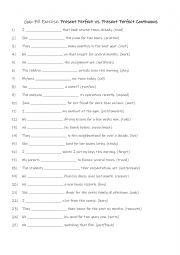
|
Gap-Fill Exercise: Present Perfect vs. Present Perfect Continuous
Learning the difference between the Present Perfect and the Present Perfect Continuous tenses can help students communicate more precisely in English.Mastering these tenses enhances a student�s ability to express time and aspects of actions in English, making their communication more effective and accurate. Students read the sentences looking for...
Level: intermediate
Age: 10-100
Type:
Downloads: 113
|
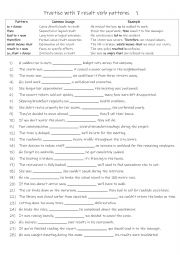
|
B1-B2 Practise with 7 result verb patterns 1
Students should learn these patterns because they are essential for expressing cause-and-effect relationships, which are fundamental in both spoken and written communication. Mastering these structures helps students connect ideas logically and cohesively, whether they are explaining events, giving reasons, or drawing conclusions. Additionally, und...
Level: intermediate
Age: 9-100
Type:
Downloads: 104
|
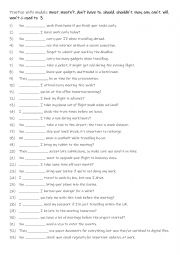
|
A1+-A2 Practise with modals must, mustn�t, don�t have to, should, shouldn�t, may, can, can�t, will, won�t & used to 3
First, students need to familiarise themselves with the modals and their use. Then they read the sentences to see which one is needed to complete the sentence. Answers on page 2.
Level: elementary
Age: 8-100
Type:
Downloads: 107
|
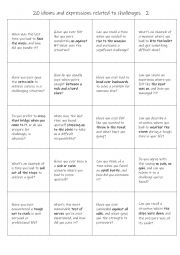
|
B1+-C1 20 idioms and expressions related to challenges 2
This is a speaking reinforcement activity to supplement the other worksheet I uploaded on 22/1/2025. Students working in pairs or small groups can either ask each other the questions or answer the question themselves.
Level: intermediate
Age: 11-100
Type:
Downloads: 117
|
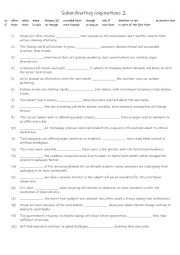
|
B1-C1 20 subordinating conjunctions 2
First, students need to familiarise themselves with the 20 subordinating conjunctions and their meanings. Then they read the sentences to see which one is needed to complete the sentence. Answers on page 2
Level: intermediate
Age: 10-100
Type:
Downloads: 124
|
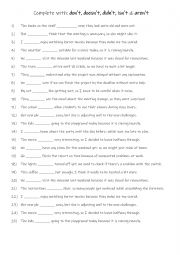
|
A1-A2 Complete with don�t, doesn�t, didn�t, isn�t & aren�t practise
Students read the sentences and complete the gap-fill with one of the following: with: don�t, doesn�t, didn�t, isn�t & aren�t. Answers on page 2
Level: elementary
Age: 8-3
Type:
Downloads: 127
|
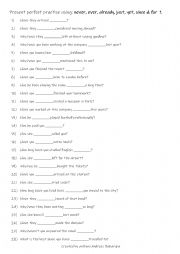
|
A2-B1 Present perfect practise using never, ever, already, just, yet, since & for 1
Practising the present perfect with words like never, ever, already, just, yet, since, and for is essential for students as it enables them to discuss experiences, recent events, and ongoing situations with clarity. These time markers help convey whether actions are completed, in progress, or relevant to the present, which is crucial for effective ...
Level: elementary
Age: 9-100
Type:
Downloads: 106
|
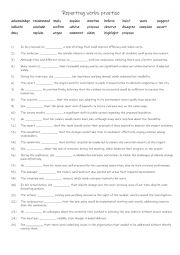
|
B1+-B2 25 reporting verbs
Reporting verbs help clarify how something is said (e.g., said, claimed, suggested), making the intent of the speaker clearer. Learning reporting verbs enhances communication by providing clarity, variety, and nuance, improving writing quality and comprehension, aiding in quoting and paraphrasing, fostering critical thinking, boosting fluency, incr...
Level: intermediate
Age: 9-100
Type:
Downloads: 101
|
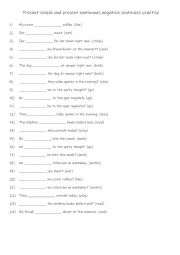
|
A1+-A2 Present simple and present continuous negative sentences practise
Students read the sentences to see which negative tense is needed to complete the sentence using the infinitive in () at the end of each sentence. Answers on page 2
Level: elementary
Age: 8-100
Type:
Downloads: 105
|
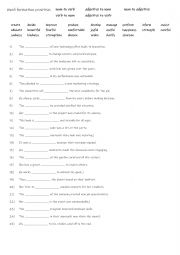
|
B1-B2 Word formation practise - noun to verb, adjective to noun, noun to adjective, verb to noun, adjective to verb
Practising word formation�changing words between forms like noun to verb, adjective to noun, or verb to adjective�enhances vocabulary flexibility and allows for more precise and varied expression. This skill is particularly useful for both speaking and writing, as it helps students adapt words to fit different contexts without losing meaning. For e...
Level: intermediate
Age: 9-100
Type:
Downloads: 113
|
|
|
|
|












